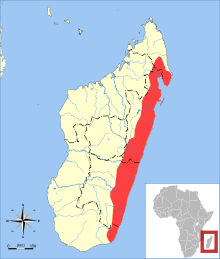Madagascar sucker-footed bat
| Madagascar sucker-footed bat Temporal range: Pleistocene to Recent | |
|---|---|
| Scientific classification | |
| Kingdom: | Animalia |
| Phylum: | Chordata |
| Class: | Mammalia |
| Order: | Chiroptera |
| Family: | Myzopodidae |
| Genus: | Myzopoda |
| Species: | M. aurita |
| Binomial name | |
| Myzopoda aurita Milne-Edwards & A. Grandidier, 1878 | |
 | |
| Madagascar sucker-footed bat range | |
The Madagascar sucker-footed bat, Old World sucker-footed bat, or simply sucker-footed bat (Myzopoda aurita) is a species of bat in the family Myzopodidae endemic to Madagascar, especially in the eastern part of the forests.[1] The genus was thought to be monospecific until a second species, Myzopoda schliemanni, was discovered in the central western lowlands.[2] It was classified as Vulnerable in the 2000 IUCN Red List of Threatened Species but is now known to be more abundant and has been reclassified as of Least Concern.[3]
The bat is named for the presence of small cups on its wrists and ankles. They roost inside the rolled leaves of the Traveller's tree,[4] using their suckers to attach themselves to the smooth surface.[5] Despite the name, it is now known that the bats do not use suction to attach themselves to roost sites, but instead use a form of wet adhesion by secreting a body fluid at their pads.[6]
Because of its unique habitat, there are no ectoparasites on sucker-footed bats because the surface of the leaves are too smooth for arthropods.[4] The majority of sucker-footed bats caught in eastern Madagascar were within or close to stands of Traveller's trees,[4] and according to research, the maximum distance they can travel while foraging is about 1.8 km (1.1 mi).[4] Sucker-footed bats feed largely on beetles and small moths.[7]
References
- ↑ H., Schliemann; Goodman, S.M. (2003). "Myzopoda aurita, Old World sucker-footed bat". The natural history of Madagascar: 1303–1306.
- ↑ Goodman, S.M., Rakotondraparany, F. & Kofoky, A. (2006). "The description of a new species of Myzopoda (Myzopodidae: Chiroptera) from western Madagascar". Mamm. Biol. 72: 65–81. doi:10.1016/j.mambio.2006.08.001.
- ↑ "2008 Red List summary statistics". IUCN. 2008.
- 1 2 3 4 M., Ralisata; F. R. Andriamboavonjy; D. Rakotondravony; O. R. Ravoahangimalala; F. H. Randrianandrianina; P. A. Racey (2010). "Monastic Myzopoda: the foraging and roosting ecology of a sexually segregated Malagasy endemic bat". Journal of Zoology. 282 (2): 130–139. doi:10.1111/j.1469-7998.2010.00724.x.
- ↑ Macdonald, D., ed. (1984). The Encyclopedia of Mammals. New York: Facts on File. p. 807. ISBN 0-87196-871-1.
- ↑ Brown University News, December 2009, Bats Don’t Use Suction After All
- ↑ M.C., Göpfert; Wasserthal, L.T. (1995). "Notes on echolocation calls, food and roosting behavior of the Old World sucker-footed bat Myzopoda aurita (Chiroptera, Myzopodidae)". Z. Säugetierkunde: 1–8.
- Chiroptera Specialist Group 1996. Myzopoda aurita. 2006 IUCN Red List of Threatened Species. Downloaded on 30 July 2007.
External links
- "Monastic" Malagasy bat mystifies experts BBC Earth News 13 July 2010
